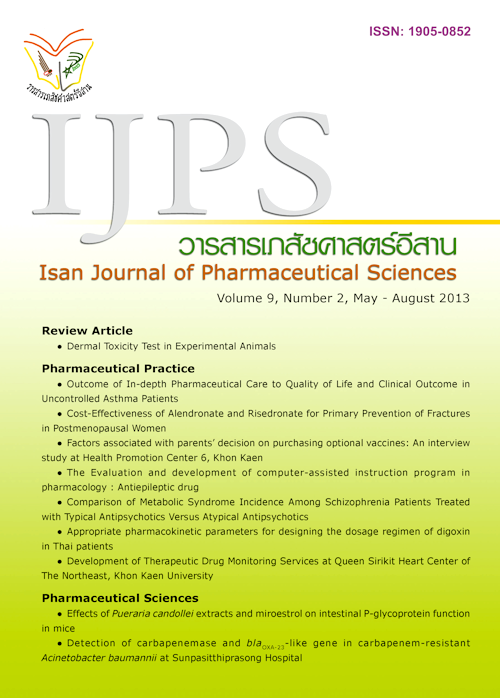Factors associated with parents’ decision on purchasing optional vaccines: An interview study at Health Promotion Center 6, Khon Kaen
Main Article Content
Abstract
Introduction: The national health policy of Thailand assigns that basic vaccines should be provided with free-of-charge for all children aged 0-5 years according to the Expanded Program on Immunization (EPI). The program provides vaccination for diseases including diphtheria, pertussis, tetanus, polio, hepatitis B, Japanese encephalitis (JE), measles, mumps, rubella, and tuberculosis. However, there are other optional vaccines (OVs) not including in the EPI because they are still not cost effective to be provided for all children in the population. The decision of purchasing these OVs is based on the judgement of parents with their own out-of-pocket expenses. This study was aimed to understand factors associated with parents’ decisions on purchasing OVs for their children, information sources and trust in OVs information. Methods: The study sample was thirty parents who decided to purchase OVs at Health Promotion Center 6 during December 2011 to January 2012. The parents of children aged 0-5 years were interviewed for information sources, factors affecting their decision making, and the economic impact of their decision. Results: The in-depth interview results suggested that there were several sources of vaccine information, and healthcare professionals were the most important and reliable sources among these. Additionally, negative economic impacts were not found in parents who purchased high-priced OVs; IPD Rota Hib Hep-A and Varicella vaccine. Their decisions were mainly based on risk, incidence and severity of diseases. Some low-income parents purchased OVs that developed from basic vaccines; Combined 5/6 diseases and Live Attenuated JE vaccine. The low-income parents were willing to pay even though they faced nagative economic impacts, because they expected lower side effects to their children. Factors associated with parents’ decision for purchasing OVs were parental factors, properties of the vaccine, occurrence of vaccine side effects, date of diseases, sources of information (healthcare professionals, people around them and the media), price, beliefs and experience. Conclusions: There were several factors associated with parents’ decision on purchasing OVs; parental factors, perception and products). Sufficient, accurate, complete, explicit and clear information were necessary for parents’ decision making on their children’s immunization.
Article Details
In the case that some parts are used by others The author must Confirm that obtaining permission to use some of the original authors. And must attach evidence That the permission has been included
References
Brown AL. What is Consumer Buying Behavior. Retrieved September 30,2011,from http://www.udel.edu/alex/chapt6.htm 2008.
Chokephaibulkit K, Chunsuttiwat S, Trishnananda M, Tharmaphornpilas P, editors. Vaccine and immunization textbook. 2007.
Kongwong R,Wattananamkul V. A study of “Harmful Cosmetics” Usage Behavior Among Female Teenages in Ubon Ratchathani Province. IJPS 2011; 7(1): 76-87.
Mansuri FA, Baig LA. Assessment of immunization service in perspective of both the recipients and the providers: a reflection from focus group discussions. J Ayub Med Coll Abbottabad 2003; 15(1): 14-18.
Marfé E. Immunizations: are parents making informed decisions? Paediatr Nurs 2007; 19(5): 20-22.
Miller NK, Verhoef M, Cardwell K. Rural parents' perspectives about information on child immunization. Rural and Remote Health 2008; 8: 863. Available from: http://www.rrh.org.au
Putchong C, Sirismutr T, Krichanan W, Udomsuk K, Tantivess S, Teerawattananon Y. The dissemination of the information concerning Human papillomavirus (HPV) vaccine via printing media in Thailand and the effect of these information for knowledge, attitude and vaccination decision among women in Thailand. Research report. Sep 2009.
Roberts KA, Dixon-Woods M, Fitzpatrick R, Abrams KR, Jones DR. Factors affecting uptake of childhood immunisation: a Bayesian synthesis of qualitative and quantitative evidence. Lancet 2002; 360(9345): 1596-9.
Li SYW, Rakow T, Newell BR.Personal experience in doctor and patient decision making: from psychology to medicine. J Eval Clin Pract. 2009 Dec; 15(6): 993 – 995.
Tongpua S, Cheawchanwattana A. Parents’ Perspectives on Purchasing Optional Vaccines: An In-depth Interview Study at Health Promotion Center 6, Khon Kaen. IJPS 2012; 8 Suppl1: 77-83.
WHO, UNICEF, World Bank. State of the world’s vaccines and immunization. 3rd ed. Geneva: World Health Organization; 2009.


